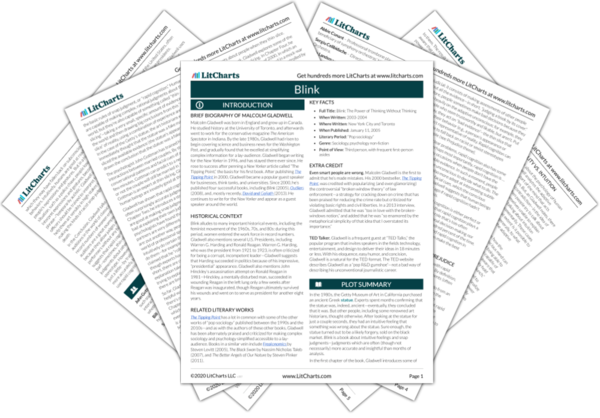One of Gladwell’s most challenging and provocative arguments concerns the role of free will in decision-making. Most people believe that human beings are free to choose what to do: they use their reason, experience, and emotion to reach a conscious choice. The only times when a human wouldn’t be acting freely would be if they were being physically forced or threatened, or if their mind were brainwashed. Blink challenges this common-sense belief by introducing the concept of the adaptive unconscious.
The adaptive unconscious undermines our traditional understanding of free will by showing that human behavior is often the product of unconscious urges and unpredictable mental associations. According to Blink, it is possible for a human to act a certain way without knowing why. For instance, subjects in one psychological experiment read a paragraph that contained numerous “trigger words”—i.e., words that evoked strong mental associations and inspired specific forms of behavior. Afterwards, the subjects walked out of the experiment more slowly than they’d walked into it: the trigger words influenced them to slow down their movements unconsciously. Similarly, Blink shows that it’s possible for humans to consciously choose to act a certain way, and yet behave differently due to the interference of the adaptive unconscious. During a series of psychological experiments, subjects exhibited racist behavior after being exposed to racist images and signs. Although the subjects weren’t overtly racist people, and even condemned racism, they were triggered to exhibit racist behavior: the images influenced their unconscious minds. In these psychological experiments, the subjects did not, in an ordinary sense, choose to walk more slowly or exhibit racist behavior—indeed, some of the subjects consciously chose to do the opposite. Instead, their unconscious minds influenced their behavior. The subjects’ actions suggest that the common understanding of free will is too simplistic—humans do not simply decide what to do; the adaptive unconscious “nudges” them in different directions.
Gladwell’s interpretation of free will might strike some people as frightening or disconcerting, since it suggests that humans are, in some ways, slaves to their own unconscious minds. And yet in some ways, Gladwell’s model of free will is preferable to the common-sense one. As Gladwell points out, it’s probably a good thing that the adaptive unconscious makes some decisions “on behalf” of the conscious mind: if the conscious mind had to decide what to do at all times, it would quickly be overwhelmed with decisions. In effect, the adaptive unconscious acts as a “valet,” making some choices independently, and allowing the conscious mind to focus on others. Furthermore, Gladwell’s model of free will doesn’t suggest that humans are totally incapable of making rational, conscious choices—it just suggests that people aren’t always as rational or single-minded as they think they are. In a way, Blink characterizes free will as a “spectrum”: our choices are neither completely conscious and free, nor are they completely unconscious and predetermined; they incorporate elements of both the adaptive unconscious and the conscious mind.
Free Will ThemeTracker

Free Will Quotes in Blink
The results from these experiments are, obviously, quite disturbing. They suggest that what we think of as free will is largely an illusion: much of the time, we are simply operating on automatic pilot, and the way we think and act - and how well we think and act on the spur of the moment - are a lot more susceptible to outside influences than we realize.
"Is the real me the one that I described beforehand?"
She paused, and Fisman spoke up: "No, the real me is the me revealed by my actions. That's what an economist would say."
Iyengar looked puzzled. "I don't know that's what a psychologist would say."
f you double the size of the chips in chocolate chip ice cream and say on the package, "New! Bigger Chocolate Chips!" and charge five to ten cents more, that seems honest and fair. But if you put your ice cream in a round as opposed to a rectangular container and charge five to ten cents more, that seems like you're pulling the wool over people's eyes. If you think about it, though, there really isn't any practical difference between those two things. Chapter 5
The problem is that buried among the things that we hate is a class of products that are in that category only because they are weird. They make us nervous. They are sufficiently different that it takes us some time to understand that we actually like them.
The Diallo shooting, in other words, falls into a kind of gray area, the middle ground between deliberate and accidental.
Most police officers - well over 90 percent - go their whole career without ever firing at anyone, and those who do describe the experience as so unimaginably stressful that it seems reasonable to ask if firing a gun could be the kind of experience that could cause temporary autism.
Look at how the officer’s experience and skill allowed him to stretch out that fraction of time, to slow the situation down, to keep gathering information until the last possible moment. He watches the gun come out. He sees the pearly grip. He tracks the direction of the muzzle. He waits for the kid to decide whether to pull the gun up or simply to drop it - and all the while, even as he tracks the progress of the gun, he is also watching the kid's face, to see whether he is dangerous or simply frightened. Is there a more beautiful example of a snap judgment?
When the screen created a pure Blink moment, a small miracle happened, the kind of small miracle that is always possible when we take charge of the first two seconds: they saw her for who she truly was.
















